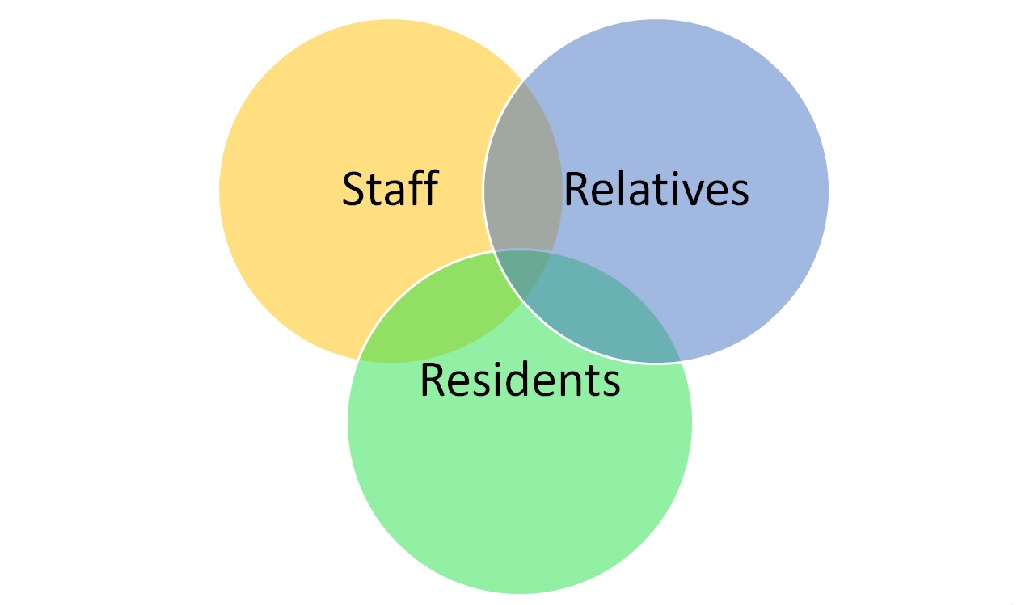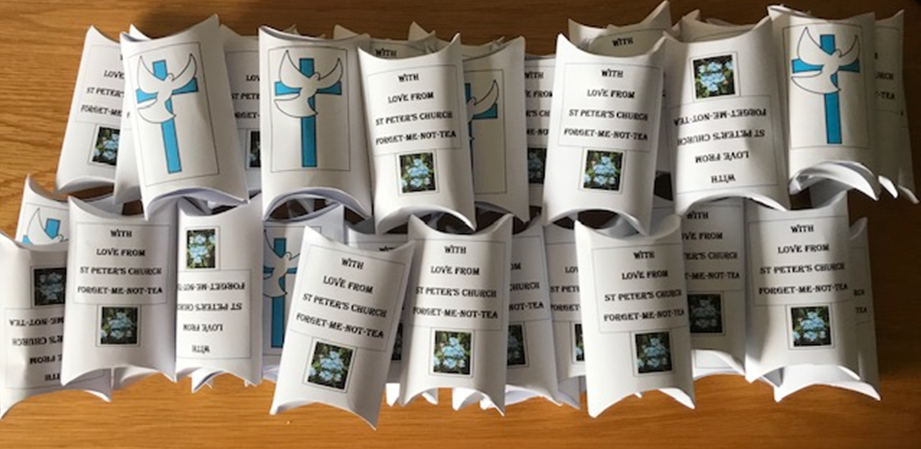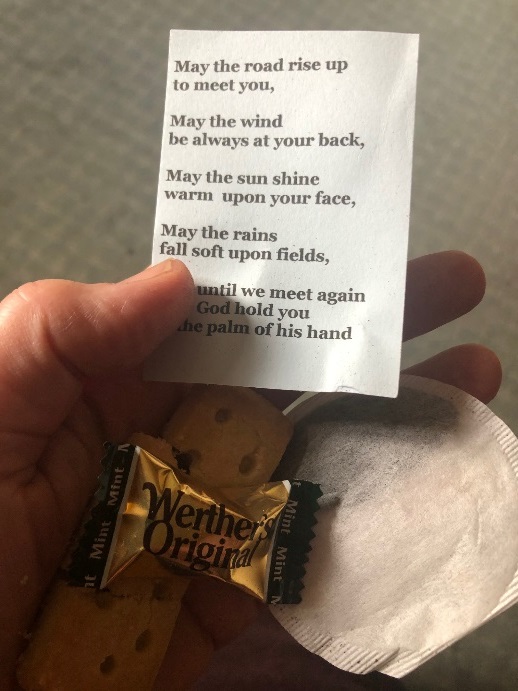 There are residential care homes in parishes across the diocese and some of these have been particularly hard hit by the Coronavirus: nationally, care home residents accounted for a quarter of Cornavirus deaths, to the beginning of May. Care homes are facing multiple challenges: infection can spread quickly because of close contact between residents, carers may unintentionally spreading the infection where there isn't appropriate protection, residents are often elderly with other underlying conditions and the latest testing confirms that some staff and residents are asymptomatic but have tested positive for Coronavirus. Earlier this month, Nandra Ahmed, Chair of the National Care Assocation, said that carehomes have felt “completely abandoned” as Coronavirus has swept across the UK.
There are residential care homes in parishes across the diocese and some of these have been particularly hard hit by the Coronavirus: nationally, care home residents accounted for a quarter of Cornavirus deaths, to the beginning of May. Care homes are facing multiple challenges: infection can spread quickly because of close contact between residents, carers may unintentionally spreading the infection where there isn't appropriate protection, residents are often elderly with other underlying conditions and the latest testing confirms that some staff and residents are asymptomatic but have tested positive for Coronavirus. Earlier this month, Nandra Ahmed, Chair of the National Care Assocation, said that carehomes have felt “completely abandoned” as Coronavirus has swept across the UK.
Across the diocese, some care home communities have been facing a devastating time on the front line, with “deaths of residents, staff shortages and exhaustion”. There’s anxiety and concern, for staff, residents and relatives, as they navigate a path through. Staff are working incredibly hard – one care home manager I spoke to last week had got to work at 7am and she was still working, bringing medication back from a late night chemist at 8.45pm, before she finally returned to her own home at 10pm: she said, “I’m exhausted – and I wouldn’t be anywhere else”. Residents are missing seeing friends and relatives - there's a noticeable impact, with the absence of the usual visits, activities and social contacts. And for relatives, too, there’s real heart-stretch, embracing anxiety and uncertainty as well as reduced contact, while it’s not possible to visit in the usual way.

Against this backdrop, with all its challenges, what are churches doing to support the community of residents, relatives and staff across our care homes? One vicar talks of “responding as the need arises and as we can...” Many churches have long term relationships with local care homes, helping them to be involved with sensitivity, discerning what’s genuinely supportive to staff, residents and relatives. It’s good to share some of the flexible ways that churches are using to keep in touch during this season.
- Phone calls: Churches are using phone calls to give support and stay in step. Phone calls can be really important, for residents and for relatives – and also for staff if they need a listening ear. There are so many experiences to hear, and it can so important to have trusted space to say how things are, even when there aren’t easy “solutions”. As people of faith, we can give space for lamentation as well as celebration, allowing people to acknowledge what’s costly and what’s being let go of and also to notice the light shining though, even when patterns change. It’s possible to arrange a “rota” of church members, if a resident is particularly valuing phone contact from church, so that phone calls are received regularly through the week.
- On-screen link up: Although it doesn’t work for everyone, for some it’s been helpful to keep connections between residents and relatives/friends though a regular on-screen link-up – and friends from church are keeping connections in this way too. It’s important to recognise the commitment and care of staff, supporting residents and relatives with this. I’ve recently heard of a heartening FaceTime linkup, with recognition from the care home resident, who is living with dementia, in her exclamation “How wonderful. I love you.”: how important to hear those treasured words. One resident at a care home in the Diocese used to be supported by a church member in attending a weekly “keep fit” class locally; the church member has made arrangements with the home and the keep fit trainer, with appropriate safeguarding measures in place, so that the resident can continue with 'keep fit' over the internet.
- The national “Daily Hope” line on 0800 804 8044 offers a free helpline, available 24 hours a day, offering music, prayers and reflections as well as full worship services from the Church of England at the end of a telephone line. It’s a wonderful resource for residents. Here’s an 'Options Card' giving details about the Daily Hope phone line: this card may be helpful to share with your local care home.
- Worship: Churches have been creative in offering online services and more.
- In Kinver, the church is recording a weekly service for two local care homes. The services are available here on the Rock Kinver channel - look for the "Prestwood" services, and get in touch with Rev Deborah Walton if you'd like copies of the service sheets.
- At St George’s Church, Shrewsbury, the local care homes have been given the link to a the weekly online service that people can access at any time during the week: here’s a link to one of these. St George’s also offers 'dial-a-sermon' for a message of about 10 minutes on 01743 297789.
- In Whitchurch, St Alkmund’s is sending a weekly mailing to the four homes where they usually hold regular services, highlighting residents who will find it particularly helpful to share the printed material and listen to the hymn. Some are also playing Revd Judy Hunt’s videos, to individual residents, sharing thoughts, reflections and prayers. Feedback has been really positive – and one home has requested a simple order of service that they might try to lead.
 Practicalities and resources: Livability has recently produced a very helpful collection of resources in a booklet called 'Dementia Inclusive Church and Covid-19: Responding to challenge with compassion', developed over the last couple of months to help people living with dementia and carers, including links to activities for people living with dementia and help with staying in touch with and supporting people living with dementia. In Whitchurch, the church has also been part of a townwide 'Helping Hands' group which has helped source protective clothing for care home staff, where needed, and also toiletries for residents. Some homes may be glad to be lent or given resources, games or activities – for example VE Day resources were shared at the beginning of the month. BBC Music Memories website is a resource that care homes may want to use, to help people connect withl musical memories. Saskia Poller from St Bartholomew’s Church in Penn has shared various items made by people from St Bart’s and from Wolverhampton Embroiderers Guild, including uniform bags for care home staff. She’s also taken pairs of hearts into a couple of homes – with one heart for the resident and the second heart for a relative.
Practicalities and resources: Livability has recently produced a very helpful collection of resources in a booklet called 'Dementia Inclusive Church and Covid-19: Responding to challenge with compassion', developed over the last couple of months to help people living with dementia and carers, including links to activities for people living with dementia and help with staying in touch with and supporting people living with dementia. In Whitchurch, the church has also been part of a townwide 'Helping Hands' group which has helped source protective clothing for care home staff, where needed, and also toiletries for residents. Some homes may be glad to be lent or given resources, games or activities – for example VE Day resources were shared at the beginning of the month. BBC Music Memories website is a resource that care homes may want to use, to help people connect withl musical memories. Saskia Poller from St Bartholomew’s Church in Penn has shared various items made by people from St Bart’s and from Wolverhampton Embroiderers Guild, including uniform bags for care home staff. She’s also taken pairs of hearts into a couple of homes – with one heart for the resident and the second heart for a relative. 
 Letters cards and gifts: The organisers of the Forget-me-not tea held monthly at St Peter’s Church in Monkmoor, Shrewsbury have cycled round little packs of (carefully and safely packaged) biscuits, teabags and a blessing, delivering them on the day of the group to people who would have usually attended, including residents of a local care home. There are ways of acknowledging the front line work being done in hare homes, such as delivering a card and small present, recognising the work of staff. For staff and for residents, any 'connections with the outside world' can be really significant. One church has got volunteers to become 'pen pals', writing a weekly letter to residents – and apparently the day the letters arrives has become a weekly highlight for many. Rev Debbie Loughran in Telford says, “We are supplying copious amounts of chocolate, love and prayers along with getting local schools to draw pictures and send message which we drop off each week. We have a team set up for prayer support either email or over the phone and we are in regular touch with the home manager.”
Letters cards and gifts: The organisers of the Forget-me-not tea held monthly at St Peter’s Church in Monkmoor, Shrewsbury have cycled round little packs of (carefully and safely packaged) biscuits, teabags and a blessing, delivering them on the day of the group to people who would have usually attended, including residents of a local care home. There are ways of acknowledging the front line work being done in hare homes, such as delivering a card and small present, recognising the work of staff. For staff and for residents, any 'connections with the outside world' can be really significant. One church has got volunteers to become 'pen pals', writing a weekly letter to residents – and apparently the day the letters arrives has become a weekly highlight for many. Rev Debbie Loughran in Telford says, “We are supplying copious amounts of chocolate, love and prayers along with getting local schools to draw pictures and send message which we drop off each week. We have a team set up for prayer support either email or over the phone and we are in regular touch with the home manager.”- Bereavement: Care homes are used to embracing life and death, but the scale of deaths has been overwhelming in some Homes recently – and it’s at times like this that people acknowledge how hard it is not to be able to share hugs. This poem 'Tis a fearful thing', written in the 12th century, acknowledged the mystery of life and death. For anyone affected by dementia, there can be added challenges in the grieving process and the charity Cruse (helping people who are bereaved), has a booklet on 'Bereavement, loss and dementia' that may be helpful in giving support to people living with dementia and those close to them, through the grieving process. If it’s not possible to attend someone’s funeral, there are Church of England resources which can be shared, including a simple card for reflection on the day of a funeral and the opportunity to light a virtual candle.
-
Please continue to hold Care Home residents, relative and staff in your prayers.
God of our voyaging,
We pray your blessing and protectio
on the community of residents, relatives and staff
in our local care homes,
navigating the deep waters of this season.
When we face into storms that threaten to overwhelm us,
give us courage and connection
in journeying through together.
When the journey takes us beyond the safety of the shore,
expand our horizons of trust, hope and love,
as we let go into Love,
in Jesus’ name,
Amen